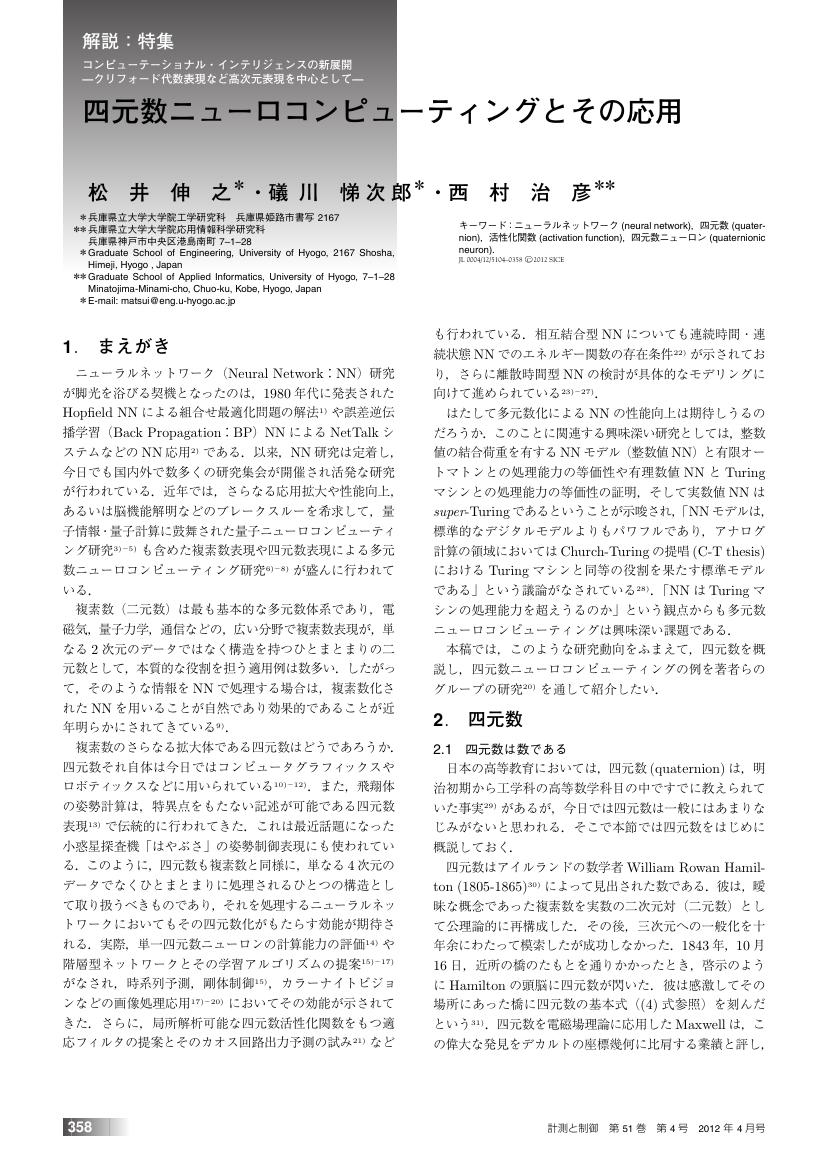10 0 0 0 OA 中立説を考慮した遺伝的アルゴリズムとその梯子型ネットワーク形成への適用
- 著者
- 礒川 悌次郎 松井 伸之 西村 治彦
- 出版者
- The Society of Instrument and Control Engineers
- 雑誌
- 計測自動制御学会論文集 (ISSN:04534654)
- 巻号頁・発行日
- vol.35, no.11, pp.1462-1468, 1999-11-30 (Released:2009-03-27)
- 参考文献数
- 8
- 被引用文献数
- 1 1
Genetic Algorithm is well-known as the optimizing algorithm taken after evolutionary strategy, and widely used for engineering problems that occur when designing a system by its self-organizing phenomenon. It is based on Neo-Darwinism, that is, the theory that individuals with advantageous characters to the given environment increase and individuals with disadvantageous ones decrease when mutation occurs in genetic characters in a population. In Genetic Algorithm, there is a premise that all the genetic characters in an organism have some meanings of adaptation. In the natural organisms, however, there are a number of neutral mutations, which is neither advantageous nor disadvantageous to their adaptation. This fact suggests that there is a new possibility of genetic mechanism in designing evolutionary systems. This is the framework motivated by the neutral theory of molecular evolution, which is different from the conventional design based on Neo-Darwinian Genetic Algorithm. In the neutral theory, some genetic characters in an individual are not positively possessed under selection pressure (not by orthogenesis), but allowed to be fixed by chance, remaining neutral to selection pressure (by random genetic drift). This leads to the supplement of redundancy to genetic information which represents an individual, and the appearance of the diversity of genetic information in a population. In this paper, in order to investigate the above point concretely, we adopt the Ladder-Network as a simple model which makes permutation of information. When we evaluate the fitness by using only the degree of correspondence between target alignment and output one, the factor of the number of steps in the network becomes the neutral character which does not directly affect the fitness.
- 著者
- 礒川 悌次郎 西村 治彦 松井 伸之
- 出版者
- 一般社団法人電子情報通信学会
- 雑誌
- 電子情報通信学会技術研究報告. NC, ニューロコンピューティング (ISSN:09135685)
- 巻号頁・発行日
- vol.111, no.157, pp.1-6, 2011-07-18
本研究では,位相振幅状態を持つ多値ホップフィールドニューラルネットワークを提案する.このネットワークにおいては,入出力値,内部状態,ならびに結合荷重は可換クォータニオンと呼ばれる数により表現されている.可換クォータニオンは,1つの実数成分,3つの虚数成分を持つ超複素数の一つであり,積演算において可換の関係が成立している.またこの数は2つの複素数を等羃元とした表現を行うことが可能であり,これらの点が通常の四元数とは異なっている.本研究においては,可換クォータニオンの位相振幅表現を用いたネットワークと,等羃元を用いたネットワークの二種類のネットワークおよびエネルギー関数を提案し,それぞれのエネルギーが単調減少する条件を導出することによりネットワークの安定性を示す.
6 0 0 0 OA 量子計算知能展望
- 著者
- 松井 伸之
- 出版者
- 公益社団法人 計測自動制御学会
- 雑誌
- 計測と制御 (ISSN:04534662)
- 巻号頁・発行日
- vol.54, no.8, pp.579-585, 2015-08-10 (Released:2015-08-25)
- 参考文献数
- 43
- 著者
- 松井 伸之
- 出版者
- 一般社団法人電子情報通信学会
- 雑誌
- 電子情報通信学会誌 (ISSN:09135693)
- 巻号頁・発行日
- vol.87, no.6, pp.471-475, 2004-06-01
- 参考文献数
- 18
- 被引用文献数
- 1
複素数の複素数ともいうべき四元数(quaternion)は一つの実数と三つの虚数部分を持つ多元数体系の一つである.三次元空間でのその回転演算記述性の良さによりコンピュータグラフィックスやロボティクスなどへの応用が近年では試みられ,その実際的応用が様々な分野に広まりつつある.本稿では,四元数を導入したニューラルネットワークを概説し,三次元アフィン変換やカラー画像の圧縮復元を例にその幾何学変換処理能力を実数値ニューラルネットワークと比較して,複素数も'びっくり'の性能威力を紹介する.
1 0 0 0 OA RCEモデルのニューロン追加機構を導入した強化学習
- 著者
- 幸田 憲明 松井 伸之
- 出版者
- 日本知能情報ファジィ学会
- 雑誌
- 日本知能情報ファジィ学会 ファジィ システム シンポジウム 講演論文集 第28回ファジィシステムシンポジウム
- 巻号頁・発行日
- pp.43-46, 2012 (Released:2013-07-25)
連続値を扱うニューラルネットワークを適用した強化学習の研究がなされているが,従来のニューラルネットワークでは,その形状とニューロン数を予め決定しておく必要があり,どのような学習結果となるか予想できない強化学習ではこれらを予測しておくことは一般に困難である. そこで本研究では,自律的にニューロンを追加するRCEモデルのニューロン生成機構を導入したニューラルネットワークによる強化学習について述べる.
1 0 0 0 OA 四元数ニューロコンピューティングとその応用
- 著者
- 松井 伸之 礒川 悌次郎 西村 治彦
- 出版者
- 公益社団法人 計測自動制御学会
- 雑誌
- 計測と制御 (ISSN:04534662)
- 巻号頁・発行日
- vol.51, no.4, pp.358-363, 2012-04-10 (Released:2021-04-20)
- 参考文献数
- 45

